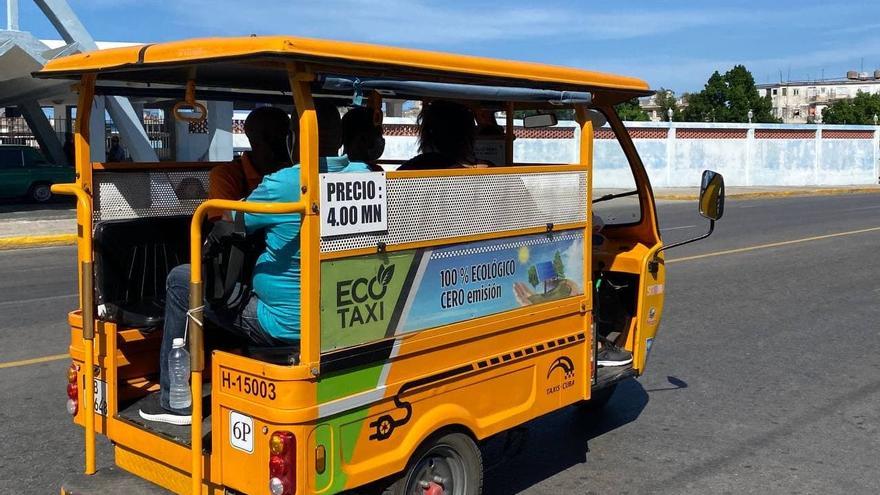
![]() 14ymedio, Havana, 30 October 2021 — After a year in which the first Ecotaxis ecological tricycles began to circulate in Havana, it has not yet been possible to “start up the solar panels to charge the vehicles,” a situation that 14ymedio warned about last April and that the official press has confirmed this Friday.
14ymedio, Havana, 30 October 2021 — After a year in which the first Ecotaxis ecological tricycles began to circulate in Havana, it has not yet been possible to “start up the solar panels to charge the vehicles,” a situation that 14ymedio warned about last April and that the official press has confirmed this Friday.
An article published in Tribuna de La Habana recounts the twelve months that the tricycles have provided services as part of public transportation in the Cuban capital. “A total of 633,836 km have been traveled, which is 2,700 km per month per vehicle,” the text says.
Passengers have benefited from a total of 119,000 trips, which is equivalent to an approximate of 350 daily trips and more than 750,000 clients “boarded the Ecotaxis during this year, and among the beneficiaries of the service the residents of Centro Habana and Habana Vieja stand out, as well as passers-by and visitors in the city.”
However, despite the triumphalist tone of the article, the local newspaper recognizes that “among the pending issues to be solved” is for “the motorcycles to work under the concept of zero emissions, since it has not been possible to start the solar panels to charge the vehicles.”
This newspaper pointed out the problem in last April’s report about these vehicles, which arrived on the island in part thanks to the Small Donations program of the Global Environment Fund, which included the installation of a photovoltaic park with a power of 10 kilowatts (kW) to charge the tricycles.
But tricycles still need fossil fuel to operate and their batteries are charged connected to the national electrical energy system, which is supplied, 95%, by fossil fuels.
An employee of Agency Number 9 of Taxis Cuba, which manages the Ecotaxis, then told 14ymedio that the photovoltaic modules “are already installed,” but “they are not yet used” to supply energy.
For the moment, the equipment “is charging for approximately seven hours, from ten at night to five in the morning,” connected to conventional power outlets, the site worker said. “Only one converter is missing” for them to start working.
At present, a total of 23 teams operate under the Ecotaxi system, of which 11 cover the route that goes from the National Bus terminal to the Parque del Curita, Parque de la Fraternidad and Cienfuegos street, until reaching the train terminal. The rest go from the railway terminal to the Hermanos Ameijeiras hospital.
A technician from the Ecotaxis agency fears that “with all the time that has passed, it is becoming increasingly difficult for the panels to start working.” The employee, who prefers to remain anonymous, reports that “the installation of the photovoltaic cells was made for the launch and the photos with the donors, but after that no further work has been done on the matter.”
“The vehicles have also had some problems and of the initial 23 it is a rare week in which they are all rolling on the street.” The technician says that “with the cost of living as it is, some of the drivers who had been enthusiastic at the beginning have asked to leave and are no longer at the helm.”
The Ecotaxis are driven by women, and the requirements to obtain a place are to have a driving license and some experience in this type of vehicle. They do not have a fixed salary and the worker who owns the tricycle has to pay 125 pesos daily to the state company, for the use of it — and the one that works as an assistant to the principal has to pay 300.
With its six seats, in an Ecotaxi trip the driver could earn at least 24 pesos for each one which would add up to 432 pesos after completing the 18 trips of the day. If they have to pay 125 to the company, the daily profit would be 307 pesos before subtracting 10% for the National Tax Administration Office (Onat).
A year ago, earning more than 300 pesos a day might seem tempting but with inflation and the rise in the cost of basic products, “the accounts are very tight,” acknowledges the employee. “Many of them have had to bear the cost of a repair out of their own pocket because if they wait for the State to fix them, they stay idle for days and they don’t earn anything.”
Yellow and with colorful “100% ecological” and “zero emission” stickers, Havana tricycles are neither as environmentally friendly nor as advantageous in terms of employment as they were originally painted to be.
____________
COLLABORATE WITH OUR WORK: The 14ymedio team is committed to practicing serious journalism that reflects Cuba’s reality in all its depth. Thank you for joining us on this long journey. We invite you to continue supporting us by becoming a member of 14ymedio now. Together we can continue transforming journalism in Cuba.
